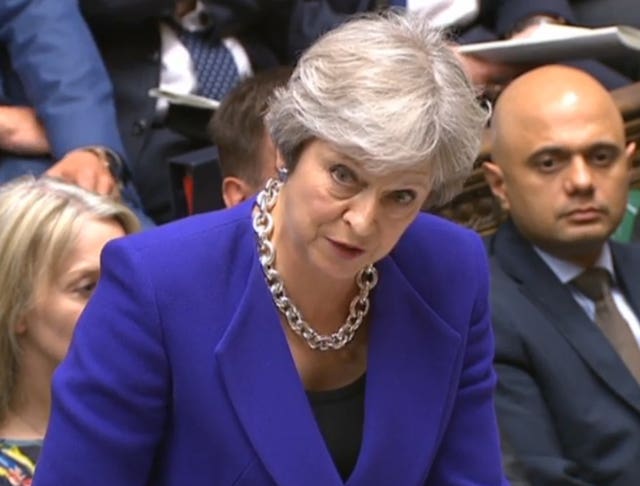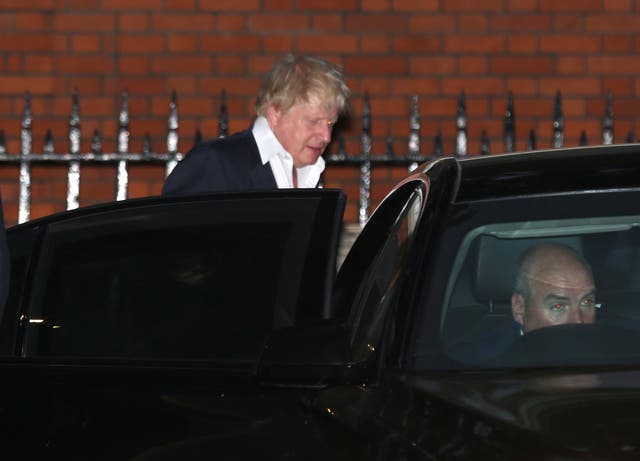
Boris Johnson is to make a personal statement to the House of Commons on his resignation as foreign secretary as Theresa May faces a grilling by senior MPs.
The Prime Minister faced continued pressure over Brexit from Tory MPs during her final appearance in the Commons chamber for the summer, and will go before the Liaison Committee later.
At around the same time, Mr Johnson will tell MPs why he quit as foreign secretary.
Mrs May was criticised by her own side at Prime Minister’s Questions, with Brexiteer backbencher Andrea Jenkyns asking pointedly “at what point it was decided that Brexit means Remain”.

A bristling Mrs May insisted at “absolutely no point” had that happened because “Brexit continues to mean Brexit”.
Former Brexit secretary David Davis called on Mrs May to publish the legal text of a draft free trade treaty based on EU precedent that was being drawn up while he was still in post, but was stonewalled.
Steve Baker, who walked out of his ministerial job at the Department for Exiting the European Union after Mr Davis quit, told the PM to “accelerate” Brexit.
Mr Baker, rising to huge cheers from Tory backbenchers, said: “It is in the national interest that we should have and have implemented contingency plans for the unwanted eventuality of exiting the EU with nothing agreed.
“Now that there is collective agreement to accelerate delivery of our plans, will she please give instructions that every communication related to no deal serves to bolster our negotiating position and by reinforcing the credibility and the feasibility of those contingency plans?”
Jeremy Corbyn claimed the Government has “sunk into a mire of chaos and division”.
The @Conservatives can't meet the needs of the country because they are too busy fighting each other. #PMQs pic.twitter.com/uwf4ADCMIz
— Jeremy Corbyn (@jeremycorbyn) July 18, 2018
The Labour leader said the Chequers agreement that was “supposed to unite the Cabinet led to the Cabinet falling apart within 48 hours”.
Resignation statements like Mr Johnson’s have previously been used by former ministers to inflict a departing blow on prime ministers with whom they have clashed.
Sir Geoffrey Howe’s 1990 speech after resigning as deputy prime minister over differences with Margaret Thatcher on Europe was widely regarded as setting in train the process which led to her departure nine days later.

Mr Johnson quit Mrs May’s Cabinet on Monday last week, declaring that the plans for the UK’s post-Brexit relations with Europe which she set out at Chequers would leave Britain a “colony”.
Mrs May will try to rally her deeply divided parliamentary party as she addresses a meeting of the 1922 Committee of backbenchers in the evening.
Leading Tory Remainer Anna Soubry called for a government of national unity to deal with Brexit, made up of Plaid Cymru, the SNP and “other sensible, pragmatic” MPs.
1/3 When someone of @NSoames standing states we need a Govt of national unity I listen. He’s right – events this week have created v serious #Brexit crisis. PM secured support for #ChequersAgreement & then scuppered it by accepting amendments from hard no deal Brexiteers
— Anna Soubry MP (@Anna_Soubry) July 18, 2018
Ms Soubry said she did not believe Mrs May was in charge any more.
“I’ve no doubt Jacob Rees-Mogg is running our country,” she told BBC Radio 4’s Today programme.
Downing Street rejected calls for a national unity government and a spokesman for Mr Corbyn said Labour would not back such a move.
“Obviously the Labour Party would have nothing to do with some kind of establishment stitch-up to deny a proper voice for our voters and the majority of people in the country (and) deny them a Brexit deal which delivers for the people of this country,” the spokesman added.
Latest Westminster voting intention (16-17 July)Con 36%Lab 41%LD 9%Oth 14%https://t.co/0QBWNYfiJS pic.twitter.com/e6vUJwDDBE
— YouGov (@YouGov) July 18, 2018
Pressure on the Prime Minister continued to mount as a poll gave Labour a five-point lead over the Conservatives.
An indication of how precarious Mrs May’s position is came in a YouGov poll for the Times, which put the Conservatives on 36%, down one point from last week, behind Labour on 41%, up two points.
:: The YouGov poll of 1,657 British adults was conducted on July 16 and 17.


Comments: Our rules
We want our comments to be a lively and valuable part of our community - a place where readers can debate and engage with the most important local issues. The ability to comment on our stories is a privilege, not a right, however, and that privilege may be withdrawn if it is abused or misused.
Please report any comments that break our rules.
Read the rules here